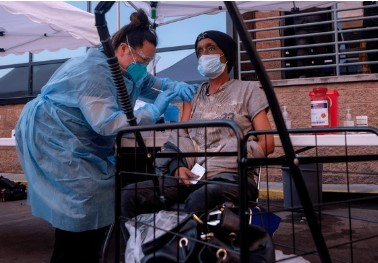Erasing Equity: How Trump's DEI Ban Is Rewriting Everything
Input
Modified
From Meritocracy to Ideological Policing: The Scope of Trump’s DEI Executive Order The Irony of Exclusion: How Rural Communities Are Hurt by the DEI Ban The Global Repercussions: Academic Censorship, International Fallout, and Legal Challenges

From Meritocracy to Ideological Policing: The Scope of Trump’s DEI Executive Order
President Donald Trump reignited a culture conflict that has become integral to his political identity upon his return to the Oval Office. He prohibited all federal funding for research, programs, or administrative activities that reference or incorporate diversity, equity, and inclusion (DEI) through a comprehensive executive order. Trump asserts that he is restoring meritocracy and objectivity to academia and science by characterizing DEI as a "toxic ideology" and an agent of division.
This executive order signifies a significant and ideologically motivated shift in U.S. policy. The cancellation of DEI-related funding and the commencement of audits of universities and researchers suspected of promoting equity-focused work are now mandated by federal agencies. Terms such as "climate justice," "gender identity," or "health disparities" are either flagged for review or disqualified outright.
The extent of the order is extraordinary. It affects all aspects of federally funded research, including language preservation, climate science, and cancer research. It even impacts international research partners, as collaborators in allied countries such as Australia are required to complete ideological questionnaires that evaluate their alignment with the values of the Trump administration.
The core of this campaign is a denial of the notion that systemic inequalities exist and should be resolved through scholarship. Universities are being compelled to discontinue well-established initiatives that enhance access and representation, including the recruitment of faculty members who are diverse and the provision of assistance to first-generation students. The primary focus of DEI initiatives is often on outcomes, rather than ideology, to guarantee that individuals from all backgrounds have the chance to succeed.
However, the administration's directive does not allow for any flexibility. The DEI moratorium regards academic inclusion initiatives as ideological corruption, rather than as evidence-based policy. In practice, the order has a chilling effect on higher education and research institutions, as administrators and academicians are now tasked with the impossible task of balancing scientific integrity with political compliance.

The Irony of Exclusion: How Rural Communities Are Hurt by the DEI Ban
Although the Trump administration portrays its DEI moratorium as a measure to curb liberal excess, its practical repercussions are having a direct impact on the communities it purports to safeguard. The most apparent contradiction is found in public health research, particularly in cancer-related programs that cater to rural and working-class white Americans.
Agencies such as the National Institutes of Health and the Centers for Disease Control and Prevention supported the development of numerous programs under health equity models. They frequently employ DEI language, which has been condemned by the administration, in order to address unequal access to care. This encompasses initiatives in the Deep South and Appalachia, regions with low cancer screening rates and high mortality rates. These initiatives prioritize geography, poverty, and systemic neglect rather than race.
For example, a cancer outreach program in Kentucky that was intended to provide mobile screening units to remote areas has been suspended. The grant application contained a reference to "addressing health disparities," which, in accordance with the executive order, may render it ineligible for funding. The irony is painful: the policy, which is intended to eradicate identity politics, ultimately exacerbates the healthcare system's marginalized conservative, low-income white communities.
Medical researchers caution that the repercussions extend beyond cancer care. Mental health outreach, addiction treatment, and maternal health programs are also impacted. These programs are frequently community-based and holistic, utilizing equitable frameworks to distribute resources to the areas that require them the most. Researchers are now compelled to choose between procuring funding or adhering to best practices, as DEI language has been penalized.
This leads to a perilous paradox: the evaluation of science is no longer based on merit or impact, but rather on ideological conformity. The outcome is a landscape in which critical public health requirements are unmet, experts are silenced, and research is fragmented. The United States is at risk of falling behind in the fundamental delivery of care to its citizens, in addition to scientific innovation, in the long term.

The Global Repercussions: Academic Censorship, International Fallout, and Legal Challenges
Trump's executive order extends beyond the confines of the United States. It is already causing diplomatic and academic strain, and its implications are global. The U.S. Office of Management and Budget has issued elaborate questionnaires to academic researchers in countries such as Australia who are collaborating with U.S. institutions. These forms inquire about the presence of DEI elements, environmental justice themes, or funding from foreign adversaries in the research.
At least eight Australian universities are currently being investigated, with six of them having already reported that their U.S. grants have been suspended or terminated. Backlash from Australian academic leaders and government officials has been precipitated by the ideological litmus test that is incorporated into these questionnaires. The endeavor has been condemned by the Group of Eight, which is composed of the nation's foremost research institutions, as political interference. Certain institutions are currently contemplating the possibility of completely withdrawing from U.S. funding.
This represents a substantial departure from the established standards of academic collaboration and international scientific exchange. Intellectual freedom and robust financing were the primary factors that propelled U.S. research institutions to the forefront of innovation for decades, rather than ideological purity. Scholars in the United States and abroad are currently compelled to evaluate their work through the prism of American political orthodoxy.
At home, the executive order is having a paralyzing effect on campuses. DEI language is being discreetly eliminated from mission statements by university administrators. Course syllabi and research abstracts are being scrutinized by faculty members. Student support services for marginalized groups are being reduced or rebranded. In order to circumvent penalties, public universities in certain conservative states are preemptively aligning with the administration's agenda.
According to legal professionals, the decree is susceptible to constitutional challenges. Critics contend that it infringes upon the First Amendment's guarantee of free expression and the Fifth Amendment's due process protections. Nevertheless, enforcement is currently proceeding. Additionally, the legal procedure may not provide timely relief in light of reports that Trump has directed federal agencies to disregard court rulings.
This politicization of knowledge has far-reaching implications. Not by evidence or necessity, but by ideology, are science, education, and public health being redefined. The global academic community is closely monitoring the situation, and certain nations are capitalizing on the opportunity. Horizon Europe, the European Union's premier research program, has extended an invitation to displaced U.S. researchers to participate. Canada, South Korea, and other nations are establishing themselves as safe havens for academic freedom.
The question for the United States is not solely whether these policies are legal or efficacious. The question is whether the nation can maintain its leadership in science, health, and education while simultaneously combating the very principles that have enabled it to do so. The DEI ban enacted by Trump is not merely a cultural war talking point; it is a disruptive policy that has significant implications for public health, academia, and science. The administration is dismantling support systems that enhance outcomes for all, particularly the most vulnerable, by framing inclusion as a threat. The consequences are already apparent: academic freedom is being threatened, partnerships are deteriorating, and research has been halted. America's dedication to equity, truth, and innovation is uncertain as the world observes.





















